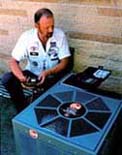If the compressor is running and the evaporator fan isn't, you've already found the main cause of your air conditioning freezing problem. The indoor coil will freeze up if the compressor runs without the evaporator fan running.
Check to see if ice has built up enough to stop the fan. If it has (and it's possible with wall mounted ductless mini split units and some window units), the fan may run normally once the ice melts, and the cause of your air conditioning freezing problem could be something else.
Once the ice has melted, check the fan or blower blades, and see if they're clean and not obstructed by something like a plastic bag, other debris, or mold growth. Remove any obstructions, and if necessary, remove the blower and clean it.
Before tearing into the rest of the unit, check the thermostat and make sure it's working right. Do the cool contacts open when the thermostat is turned up to a higher temp than the room temp? If not, the thermostat has failed, and never turns the unit off, which can definitely cause an air conditioning freezing problem.
Do the fan contacts open and close when the thermostat setting is turned higher and lower than the room temperature? If the fan contacts never close but the cool contacts do, the thermostat has failed and caused your air conditioning freezing problem. If the fan contacts close, but the fan doesn't run, check the fan relay in the air handler.
If the fan relay is not getting control voltage, the circuit is open between the thermostat and the fan relay. Look for a loose connection, wrong connection, disconnection, or broken wire. If it gets control voltage but doesn't energize, it has failed, and must be replaced.
If it energizes but the fan doesn't run, check for line voltage on the load side of the relay. If there is line voltage on the load side of the relay and the fan doesn't run, you'll have to troubleshoot the load side circuit and the fan motor as detailed further on.
If the thermostat checks out OK, set the thermostat to "fan on" and make sure the blower runs in the correct direction and at the proper rpm, that it is installed in the housing correctly, and is the right size.
If the blower is installed backwards or is running in reverse, the coil can freeze up. (Although I have seen several units that didn't freeze up with reversed blowers.) You will need to turn the blower around, reverse the rotation of the motor if it is a reversible rotation motor, or install a motor with the correct rotation.
A blower that runs too slow can cause an air conditioning freezing problem. You'll need to install a motor that runs at the correct speed.
A blower that is too small, or that is installed in the housing incorrectly, can cause an air conditioning freezing problem. You will need to install the correct size blower, and be sure it is installed correctly in the housing. This means centered, with volutes installed, and the curve of the vanes matching the outlet of the housing.
If the blower is the wrong size, if the bearings are failing, or it has an open start winding or a failed run capacitor, it could be overheating and stopping intermittently. A motor that is overheating and stopping intermittently can cause an air conditioning freezing problem.
To check out the evaporator fan motor:

Take a look at the evaporator coil. Is it clean? Can you see your flashlight shining through from the other side? If the coil's dirty, you'll have to do some coil cleaning.
A dirty evaporator coil is a common cause of air conditioning freezing. And it's one of the problems that can be prevented with regularly scheduled air conditioning maintenance.
If the coil is clean, check the ducting to make sure nothing is blocking airflow. Blocked ducting will stop airflow through the evaporator coil, and this will cause the coil to freeze up.
If your coil is clean and the ducting is clear, let's run the unit and check the operating pressures and temperatures.
If your discharge and suction pressures are low, with a low compressor amp draw, low subcooling, high superheat, and low temperature splits across your evaporator and condenser coils, you probably have a leak. Shut the unit down, find the leak, and repair it.
If you are totally unable to locate the leak with a bubble solution or electronic detector, you'll have to charge in refrigerant to correct pressures, temperatures, and superheat and subcooling values, and it would be a good idea to add some air conditioning leak detector dye so the leak can be found later on.
You have to use some common sense about leaks. If the leak is so small that you can't find oil or any other sign, unless the customer agrees to pay you for all the time you spend, it's more cost effective to charge in the small amount of refrigerant it will take to get the unit running correctly, finish the service call, and be on your way.
I can't imagine that there's a service technician out there who hasn't run into the same problem many times. Use some common sense, be upfront with your customer, and if you've done your best not only to find the leak, but to get the unit running right and save your customer unnecessary expense, consider it a job well done.
If your suction pressure is low enough to cause the evaporator to freeze up, but you have high subcooling and high superheat, either your metering device is restricted or the wrong size, your drier is restricted, or your liquid line is restricted.
Evaluate all of the system's operating characteristics to isolate the restriction.
Publication date: 09/04/2006





